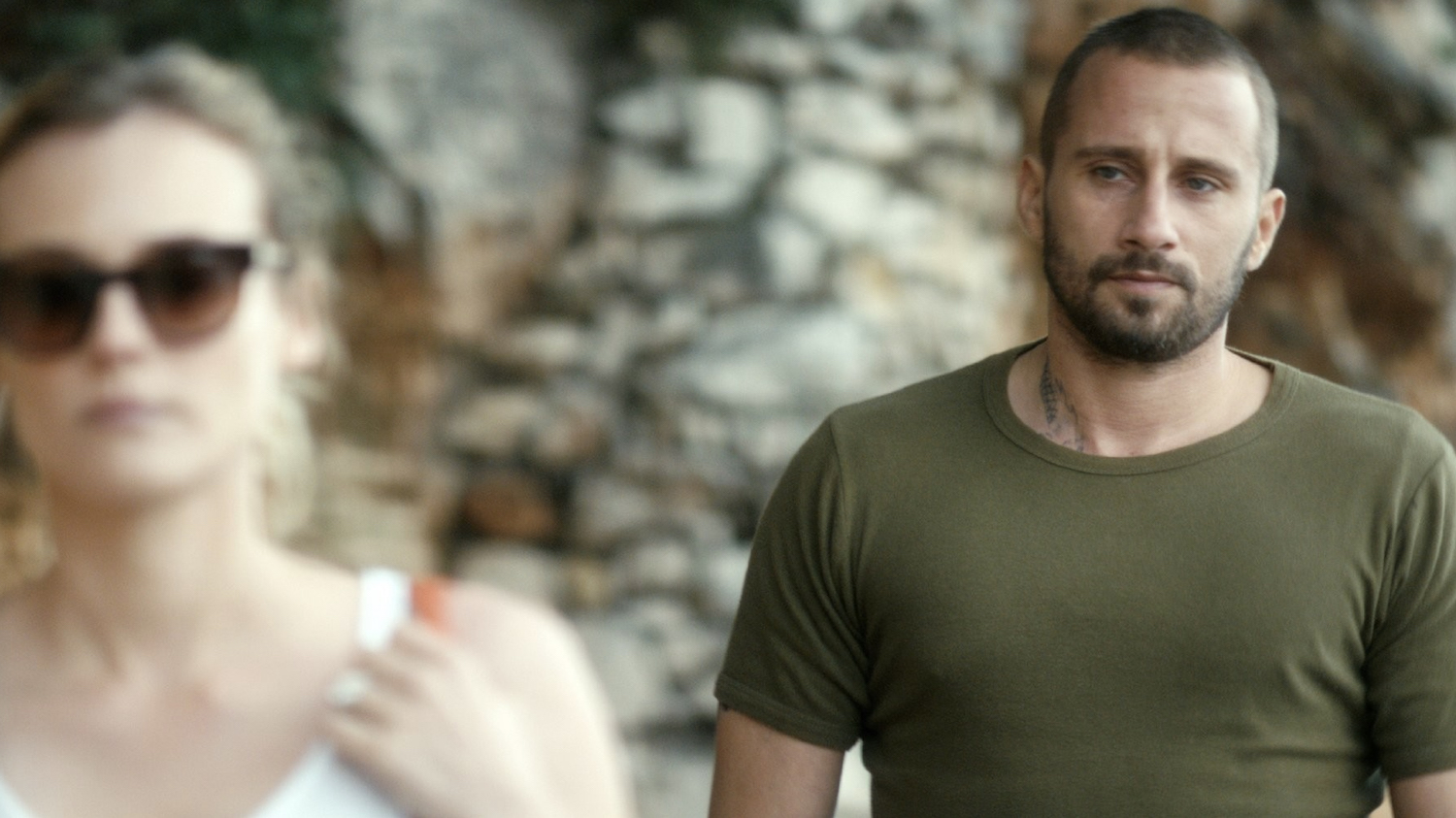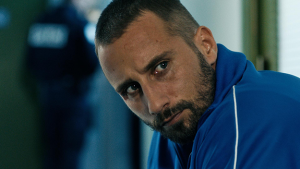
(French writer/director Alice Winocour is back with Disorder (formerly known as Maryland) an imperfect yet compelling take on the PTSD drama. The film premiered at the 2015 Cannes Film Festival in the Un Certain Regard section and is in limited release now via IFC Films.)
Since PTSD (Posttraumatic Stress Disorder) was first diagnosed as an actual condition for war veterans, in 1980 – and even before, when it went by other names – the world has seen its share of movies with afflicted soldiers as principal subjects or supporting characters. Since conflict is the heart of drama, what better source for a screenplay than someone suffering from both internal (psychological) and external (battle-related) demons? Now, from French writer/director Alice Winocour (Augustine) comes another cinematic tale, Disorder, of a man hobbled by his combat experience. This time, however, the PTSD serves as backdrop to a larger tale of resilience and resourcefulness in the face of danger. It’s always present and always a factor, but not the main focus. What we get, instead, is a compelling enough thriller, with two strong lead performances that may, itself, be hobbled by its own disorder (a flawed script), yet showcases excellent direction and camerawork from Winocour. It’s engaging, if imperfect.
Versatile, multilingual Belgian actor Matthias Schoenaerts (Far from the Madding Crowd) stars as Vincent, a soldier on leave (perhaps permanent) from the war in Afghanistan (yes, my fellow Americans, although the French stayed out of Iraq, they joined us in the home of the Taliban). As the film begins, he learns from a doctor that his condition will keep him out of the conflict, information that he accepts reluctantly. So when he is offered a private-security gig protecting a Lebanese businessman at a party, he accepts. There, he and his fellow vets set up a professional perimeter, though noises and people keep on distracting Vincent, who perhaps recalls recent experiences. The businessman’s wife, Jessie – played by the (also versatile, also multilingual) German actress Diane Kruger (The Infiltrator) – holds his attention, however, since she seems as uncomfortable among the various dignitaries and wheeler-dealers as is he. Vincent watches her, on the security cameras, put her son to bed, lingering just a little longer than he should on the zoom. Despite his troubles, however, Vincent still manages to overhear just enough of the conversations at the party to decide that all is not as it seems in this supposedly proper business world. Is it PTSD-induced paranoia, or is he on to something?
To be honest, the film would have been more interesting had the threats been purely imaginary, but as it turns out, Vincent is not, in fact, deranged, and something nefarious is afoot. Improbably, as a newcomer to the family, he is asked to watch over Jessie and Ali, her son, while hubby is away for a few days. Despite this mostly unbelievable scenario (would you entrust your loved ones to a man you don’t know?), Winocour masterfully builds tension in this second part of the story, as we’re never quite if what we’re seeing is real or imaginary. Both Schoenaerts and Kruger are, as always, a pleasure to watch, and here they almost seem to be engaged in a contest of contemplative gazing, each trying to decipher the other’s purpose and intent. When the film does, occasionally, explode in violence, those scenes are handled with technical aplomb, for sure, but they are not ultimately the attraction of the movie.
Rather, as an exercise in behavioral performance, Disorder would have been better served with even greater narrative restraint, since Winocour stumbles over the credibility of her plot whenever she strays from the relationship between Vincent and Jessie. That said, it is impressive how much she accomplishes with so little – most of the film takes place in the villa that gives the film its original French title (Maryland, which works much better than the silly English “translation”) – and she clearly has a strong sense of camera and lighting aesthetics that bode well for her future career (this is but her second feature). It’s also unfortunate that, intentionally or not, all people of color in the film (Arabs and other Middle-Easterners), with the exception of Jessie’s son, are, to varying extents, villainous. It’s a missed opportunity, since one of the very first bits of dialogue we hear revolves around the irony of French soldiers now protecting someone from Lebanon when they’ve just come back from killing people who (to them) look just like him (to Winocour’s credit, the conversation is subtler than that). Perhaps she just needed another draft or two to fine-tune the screenplay. Whatever the reason for the story’s flaws, however, there is no question that the central performances and the accompanying cinematography make much of Disorder worth watching.
– Christopher Llewellyn Reed (@ChrisReedFilm)












